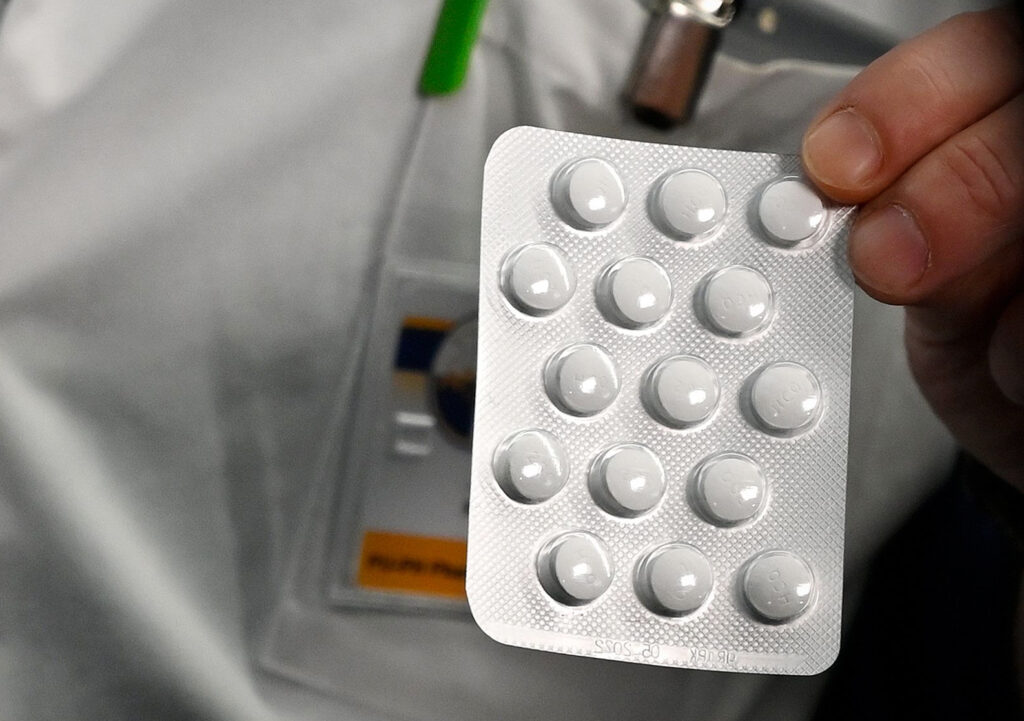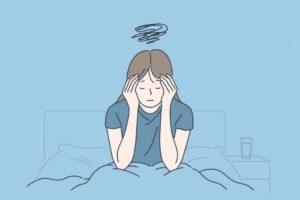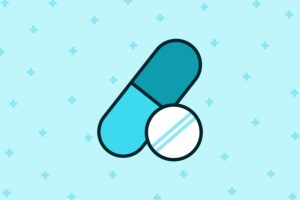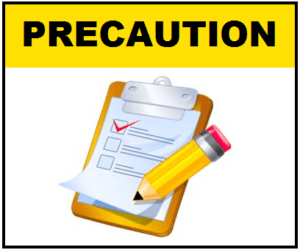If you or someone you know is struggling with OCD, there may be hope. Risperdal is a powerful drug that is effective in treating obsessive-compulsive disorder. This medication can help to reduce the severity of symptoms and improve the quality of life for those who suffer from this condition. If you are considering Risperdal as a treatment option for OCD, it is important to understand how it works and what potential side effects you may experience.
Contents
What Is OCD? 
OCD is a mental health disorder that is characterized by repetitive, intrusive thoughts (obsessions) and/or repetitive behaviors (compulsions). People with OCD often feel compelled to perform certain rituals or tasks to ease their anxiety. These rituals can be time-consuming and interfere with everyday life.
What Is Risperdal?
Risperdal is a powerful drug that is used to treat an obsessive-compulsive disorder OCD. It belongs to a class of drugs known as atypical antipsychotics, and it works by affecting the way that certain chemicals in the brain are released and reabsorbed.
How Is Risperdal Useful For OCD?
Risperdal can help reduce the frequency and intensity of obsessions and compulsions, making it easier for people with OCD to manage their symptoms.
Risperdal is a powerful drug that works by inhibiting the action of serotonin, a neurotransmitter that plays a role in OCD. By blocking serotonin, Risperdal decreases the activity of the brain’s “circuit” that is responsible for OCD symptoms. This can lead to a reduction in obsessions and compulsions.
Risperdal is effective in reducing OCD symptoms in both children and adults. Taking it would reduce the following OCD symptoms:
- obsessive thoughts
- compulsive behaviors
- intrusive thoughts
- anxiety
- fear
It is important to remember that risperidone is not a cure for OCD, but it can be an effective treatment for reducing symptoms. If you or someone you know is struggling with OCD, talk to your doctor about whether risperidone may be a good option for treatment.
What Are The Side Effects?
Risperidone can also cause some serious side effects, so it is important to discuss the risks and benefits of the drug with your doctor before starting treatment. For example, it can cause
Weight Gain 
Risperdal can cause weight gain by increasing appetite or by causing fluid retention. Weight gain is a common side effect of Risperdal, and it is usually dose-related. That means that the higher the dose of Risperdal, the greater the risk of weight gain. Furthermore, Risperdal may also cause other side effects that can contribute to weight gain, such as fatigue and drowsiness.
Difficulty Urinating
Risperdal can cause difficulty urinating for several reasons. The first is that the drug can relax the muscles in the bladder, making it difficult to urinate. Additionally, Risperdal can increase the amount of urine produced by the body, which can also lead to difficulty urinating.
Finally, Risperdal can also cause side effects like dry mouth and constipation, which can make it difficult to urinate as well.
Risk Of Developing Diabetes
Risperdal for OCD can increase the levels of prolactin in your body. Prolactin is a hormone that helps regulate the production of insulin. When prolactin levels are high, it can lead to insulin resistance and eventually diabetes.
Therefore, Risperdal for OCD may increase your risk of developing diabetes. If you have a family history of diabetes, or if you are overweight, you may be at an even higher risk.
Tardive Dyskinesia
Risperdal can cause tardive dyskinesia, a condition that results in involuntary movements of the face and body. This is a disorder that causes involuntary movements of the facial muscles, tongue, and lips. It can also cause difficulty speaking and swallowing.
The exact mechanism is unknown, but it is thought to be related to the drug’s ability to block dopamine receptors. Symptoms typically begin after several months of treatment and may persist even after the drug is discontinued. In some cases, the movements can be permanent.
Dry Mouth
Risperdal can cause dry mouth because it is a medication that affects the autonomic nervous system. The autonomic nervous system controls all of the automatic functions of the body, including saliva production. When Risperdal slows down saliva production, it can cause dry mouth.
Dizziness
Risperdal can cause dizziness for several reasons. First, it is a powerful antipsychotic medication that alters the levels of various neurotransmitters in the brain. This can lead to a feeling of wooziness or imbalance.
Additionally, Risperdal may also affect the vestibular system, which controls balance and eye movement. This can result in vertigo or a spinning sensation. Finally, Risperdal may also cause drowsiness as a side effect. For instance, one study found that risperidone (the active ingredient in Risperdal) caused drowsiness.
These side effects are usually mild and go away on their own. it is important to be aware of the potential side effects before starting treatment.
Who Should Not Use Risperdal?
Risperdal is not meant for everyone who is suffering from OCD. There exist certain exceptions to the type of individuals. Below is the category of those people who should not use Risperdal for treating their OCD.
Hypersensitive People 
Some people with hypersensitivity to risperidone should not use Risperdal for OCD because it can cause serious side effects. For example, people who are allergic to risperidone may experience anaphylactic shock, which can be life-threatening.
Additionally, risperidone can also cause akathisia, a condition characterized by restlessness and anxiety. Akathisia can be very uncomfortable and can make it difficult for people to stay on their medication regimen.
Finally, risperidone may also cause tardive dyskinesia, a condition characterized by involuntary muscle movements. Tardive dyskinesia can be permanent and can significantly impair a person’s quality of life.
Pregnant Or Nursing Women
Risperdal can pass into breast milk and may harm a nursing baby. Pregnant or breastfeeding women should not use Risperdal for OCD because it can cause serious side effects in the developing baby.
Some of these side effects include birth defects, low birth weight, and developmental problems. Additionally, Risperdal can pass into breast milk and may harm a nursing baby. Furthermore, using Risperdal during pregnancy may increase the risk of preterm labor and delivery.
Children Under The Age Of 18
Risperdal is not approved for use in children under the age of 18. This is because it has not been studied enough in this age group to know whether it is effective or safe. In addition, Risperdal can cause serious side effects in children, including problems with movement and changes in blood sugar levels.
Furthermore, children may be more likely to experience withdrawal symptoms if they stop taking Risperdal suddenly which can include rebound anxiety, irritability, and agitation.
People With Serious Disorders
Besides, those who are restricted to take Risperdal for treating their OCD or who are suffering from
Dementia
There are a few reasons why elderly patients with dementia should not use Risperdal for OCD. One reason is that Risperdal can cause tardive dyskinesia, a serious neurological condition characterized by involuntary movements of the face and body.
Elderly patients with dementia are especially vulnerable to developing tardive dyskinesia because they often have other underlying medical conditions that can worsen the condition.
Another reason why Risperdal should be avoided in elderly patients with dementia is that the drug can increase the risk of strokes and heart attacks. This is particularly true in those who already have cardiovascular disease.
Finally, Risperdal can also cause the neuroleptic malignant syndrome, a potentially fatal condition that causes muscle stiffness, fever, and changes in mental status.
Liver Or Kidney Disease
Risperdal may not be metabolized properly in these patients and could cause serious side effects.
Patients with liver or kidney disease should not use Risperdal for OCD because the drug can aggravate these conditions. For example, Risperdal can increase the levels of a certain enzyme in the liver, which can lead to liver damage. In addition, Risperdal can cause kidney damage by causing a build-up of fluid in the kidneys. Moreover, Risperdal can also interact with other medications that patients with liver or kidney disease are taking, which can further exacerbate these conditions. It can complicate things even further if patients with liver or kidney disease also have OCD, as they may be more likely to develop compulsive behaviors around taking their medications correctly. In short, Risperdal for OCD is not recommended for patients with liver or kidney disease.
Cardiovascular Disease
Patients with a history of cardiovascular disease should not use Risperdal for OCD because the drug can cause an increase in blood pressure and heart rate. This can lead to serious cardiovascular events such as strokes and heart attacks. The reason is that Risperdal can cause an imbalance of serotonin in the body, which can lead to these cardiovascular problems.
Additionally, Risperdal can also cause an increase in prolactin levels, which can lead to a decrease in libido and erectile dysfunction which may result in cardiovascular problems.
Another reason why Risperdal should not be used by patients with a history of cardiovascular disease is that the drug can cause an increase in cholesterol levels. This can lead to atherosclerosis, which is the buildup of plaque in the arteries. This can then lead to serious cardiovascular events such as heart attacks and strokes.
A History Of Seizures
Patients with a history of seizures should not use Risperdal for OCD because Risperdal can lower the seizure threshold and cause patients to have more seizures. For example, if a patient has a seizure disorder and is taking Risperdal for OCD, the Risperdal may cause the patient to have more seizures.
Furthermore, people with seizures should not use Risperdal because it can increase the risk of seizure-related death. Finally, Risperdal for OCD is not recommended for patients with a history of seizures because it can cause serious side effects such as liver damage and pancreatitis.
Low White Blood Cell Counts
Patients with a history of low white blood cell counts should not use Risperdal for OCD. The very first reason for this is that Risperdal can lower the white blood cell count, which can make it difficult for the body to fight infection.
Secondly, Risperdal can also cause changes in the way the body processes sugar, which can lead to a serious condition called diabetic ketoacidosis. This condition can be fatal if not treated immediately.
Finally, Risperdal can also increase the levels of a hormone called prolactin, which can interfere with ovulation and menstrual cycles in women. All of these side effects can be extremely dangerous, especially for patients who are already immunocompromised. Therefore, patients with a history of low white blood cell counts must avoid Risperdal altogether.
How Is Risperdal Taken? 
There is no one-size-fits-all answer to this question, as the best way to take Risperdal for OCD will vary from person to person. However, some general guidelines can be followed.
- It is important to start with a low dose of Risperdal and gradually increase the dose as needed. This will help to minimize the risk of side effects. It is also important to take Risperdal at the same time each day. This will help to maintain a consistent level of the drug in your system.
- Risperdal should be taken with food. This will help to reduce the chances of an upset stomach or other gastrointestinal problems. It is also important to drink plenty of water when taking Risperdal. This will help to keep your body hydrated and will also help to flush the drug out of your system.
- Take the drug in the morning so that you can reduce the Risperdal dosage over time. If Risperdal causes drowsiness, it is best to take it at night. Be sure to speak with your doctor about the best way to take Risperdal for OCD.
- Do not suddenly stop taking Risperdal as this can cause withdrawal symptoms. If you need to stop taking the drug, your doctor will gradually reduce your dose over time.
- If you are taking Risperdal for OCD, it is important to be patient. It can take several weeks or even months for the full effect of the drug to be felt. However, if you stick with it, Risperdal can be a powerful tool in treating OCD.
Furthermore, Risperdal is not a cure for OCD. However, it can help to lessen the symptoms and make them more manageable. If you are struggling with OCD, Risperdal may be worth considering as part of your treatment plan.
What Are The Precautions?
Risperdal is a powerful drug that can be effective in treating OCD. However, there are some precautions to take when taking this medication.
- First and foremost, it is important to talk to your doctor about any potential risks associated with taking Risperdal for OCD.
- Secondly, Risperdal may cause some side effects, so it is important to be aware of these before starting the medication.
- Finally, Risperdal should not be used in children under the age of 18 unless directed by a doctor. If you have any questions or concerns about taking Risperdal for OCD, be sure to talk to your doctor. With their help, you can make an informed decision about whether or not this medication is right for you.
Apart from the above, below are some generalized safeguards to keep in mind while you are taking Risperdal for OCD:
- Avoid drinking alcohol while taking Risperdal.
- Risperdal may make you drowsy, so it is important to avoid driving or operating machinery until you know how Risperdal affects you.
- Risperdal may interact with other medications, so be sure to talk to your doctor about all the medications you are taking before starting Risperdal.
By following these precautions and talking to your doctor, you can help ensure that Risperdal is safe and effective for treating OCD.
Consulting A Doctor
If you’re considering Risperdal for treating your OCD, it’s important to consult with a doctor first. They will be able to determine whether the drug is right for you and monitor your progress while you’re taking it. Risperdal can be a powerful tool in managing OCD, but it’s not right for everyone. Make sure to talk to your doctor about all of your options before making a decision. You can ask the following questions:
- What are the risks and side effects of Risperdal?
- How will Risperdal be monitored?
- What other treatment options are available to me?
- What should I do if I experience any side effects?
By getting all the information from your doctor, you can make an informed decision about whether Risperdal is right for you. Don’t hesitate to ask questions and get clarification if needed.
It is your health and you want to make sure you’re making the best decisions for yourself. If Risperdal is prescribed, be sure to follow your doctor’s instructions on how to take it.
Conclusion
At the end of this article, it is concluded that Risperdal is a powerful drug for treating OCD. it has shown to be very effective in clinical trials and Risperdal has helped many people who suffer from this debilitating disorder. risperdal is a safe and effective treatment for OCD and should be considered as the first line of defense against this condition.
If you or someone you know suffers from OCD, Risperdal may be the answer to finally getting relief from the constant worrying and intrusive thoughts. Be sure to talk to your doctor about whether Risperdal is right for you.
Finally, life is yours to live, don’t let OCD control it. risperdal can help you take your life back and enjoy the things you once loved again.
The initial step on your road to recovery is expert assistance. You may contact Mantra Care for expert help right away if you prefer. Our experts will assist you in determining and overcoming your issue. To book your online therapy, download our free Android or iOS app.









